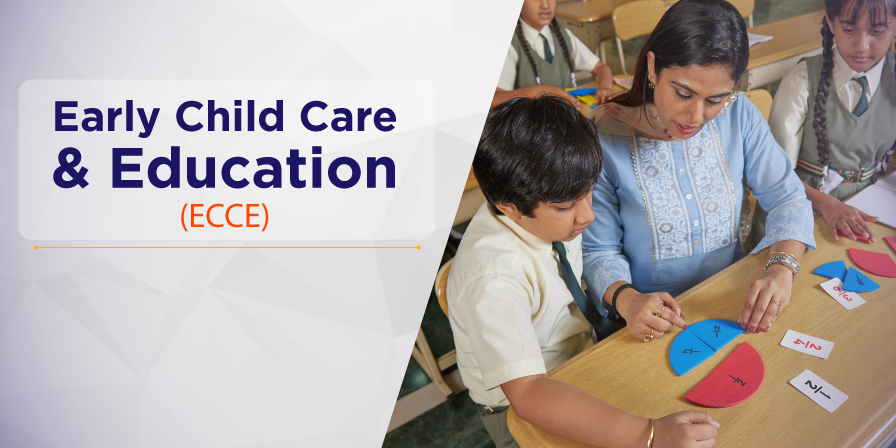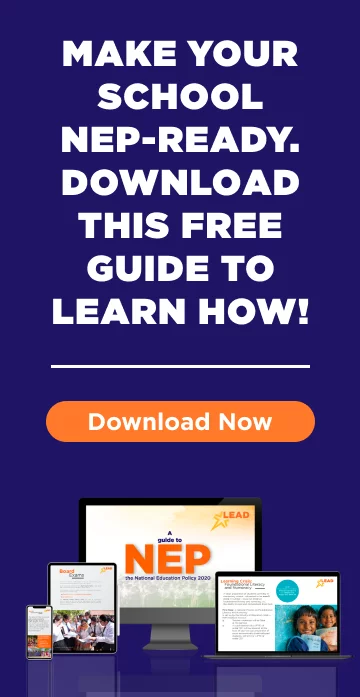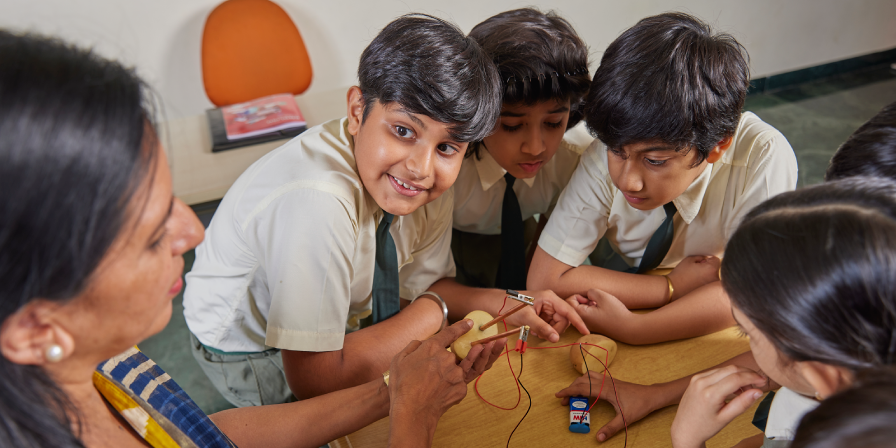National Education Policy NEP 2020 Explained
Importance of Early Childhood Care & Education in NEP 2020

Importance of Early Childhood Care & Education in NEP 2020
Last Updated On: 11/09/2024
Nitin Virmani
School Owner

Children are like wet cement. Whatever falls on them makes an impression. — Haim Ginott, a noted child psychologist
According to the revised policy, there is a dire need to give all young children universal access to high-quality Early Childhood Care and Education (ECCE) across the country, with a special focus on children from socio-economically disadvantaged backgrounds.
In this article

What is ECCE?

Importance of ECCE in Child Development

Role of NEP 2020 in Strengthening ECCE

The Purpose of ECCE

Challenges in Implementing ECCE
What is Early Childhood Care and Education (ECCE)?
ECCE is not merely preparation for primary school; it is a comprehensive approach to early childhood education, encompassing flexible, multi-level, play-based, inquiry-based, and activity-based learning. The NEP 2020 outlines the types of learning included in ECCE:
- Core Learning Areas: Alphabets, numbers, counting, colors, shapes, and languages.
- Creative and Cognitive Development: Problem-solving, puzzles, logical thinking, and various forms of art such as drawing, painting, music, and movement.
- Social and Emotional Growth: Emphasising good behaviour, ethics, teamwork, cooperation, and cleanliness.
Importance of ECCE in Child Development
Early childhood, spanning from birth to age 6, is a crucial period for a child’s cognitive, physical, social, and emotional development. During this phase, the brain is most receptive to learning, making it vital to provide high-quality care and education. Despite its importance, access to quality ECCE remains limited in many parts of India, particularly for children from socio-economically disadvantaged backgrounds.
Challenges Faced:
- Lack of Standardisation: There is a widespread lack of awareness about the appropriate content and teaching methods for this age group, resulting in inconsistent educational experiences.
Never miss a story
Stay updated with the latest news and articles related to school education
GIVE YOUR SCHOOL THE LEAD ADVANTAGE
The Role of NEP 2020 in Strengthening ECCE
The Indian Government released the National Early Childhood Care and Education (ECCE) policy to provide integrated services for the continuous holistic development of children up to age 6. However, government Anganwadi centres, pre-primary schools, and private nurseries failed to implement it in full force and effect.
Keeping all these vital things in view, the New Education Policy 2022 brings a strong focus on ECCE and includes it in the new 5+3+3+4 pedagogical structure in the form of the Foundational Stage. The current 10+2 structure does not cover children ages 3 to 6, as Class 1 begins at age 6.
The new 5+3+3+4 structure, on the other hand, includes a strong base of Early Childhood Care and Education (ECCE) from the age of 3 to promote better overall learning, development, and well-being of children./
Key Focus Areas of ECCE in NEP 2020
- Universal Access: Access to free, safe, and high-quality ECCE at Pre-schools/Anganwadis/Balvatikas for all children from 3 to 6 years.
- Foundational Learning Curriculum: For ages 3-8, the curriculum is divided into two parts: Foundation learning curriculum from ages 3-6 in ECCE and 6-8 in classes I and II in primary school.
- Multi-faceted Learning: A strong focus on play, activity, and inquiry-based learning through a flexible learning system to develop Foundational Literacy & Numeracy (FLN).
- Preparatory Class: Before the age of 5, every child will be moved to ‘Preparatory Class’ or ‘Balvatika’ (that is, before Class 1), which has ECCE-qualified teachers imparting play-based learning.


The Purpose of Early Childhood Care and Education (ECCE)
The overall aim of ECCE is to attain optimal outcomes in different domains like:
- Cognitive development
- Physical and motor development
- Socio-emotional-ethical development
- Communication skills development
- Cultural/artistic development
- The development of early language, literacy, and numeracy.
In the context of Early Childhood Care and Education (ECCE), the New Education Policy 2022 tries to focus on two essential components:
- Strengthen the pedagogical and curricular framework for early childhood education with the help of NCERT (National Council of Educational Research and Training).
- Build high-quality infrastructure with well-trained teachers.
Challenges in Implementing Early Childhood Care and Education
The challenges and hurdles school owners may face in implementing ECCE include:
- Unavailability of well-trained teachers in Anganwadis, private nurseries, and pre-primary schools.
- Deficiency in supplies and poor infrastructure in Anganwadis for education.
- Anganwadis tend to contain more children from the age group 2-4 and fewer in the educationally critical age range of 4-6-year.
- They also have few teachers specially trained and dedicated to early childhood education.
- Most private pre-schools are based on rote memorisation and lack play-based learning.
Implementing ECCE Under NEP 2020
The New Education Policy 2022 states that the planning and implementation of ECCE will be carried out jointly by the Ministry of HRD, Women and Child Development (WCD), Health and Family Welfare (HFW), and Tribal Affairs in a phased manner. Key strategies include:
- Enhanced Infrastructure: Upgrading Anganwadis and pre-schools with improved facilities and learning environments.
- Teacher Training Programs: Introducing certificate and diploma programs for Anganwadi workers and teachers, focusing on ECCE principles.
- Community Engagement: Involving parents and communities in the early education process to ensure holistic development.
- Priority to Disadvantaged Areas: Special attention to socio-economically disadvantaged districts and the introduction of ECCE in tribal Ashramshalas.
How Does LEAD Group Suppport ECCE Implementation?
LEAD Group, India’s largest School EdTech company, enables Indian schools to deliver high-quality teaching and learning experiences that align with the New Education Policy 2020. At LEAD, we impart Early Childhood Care and Education from early pre-primary years with:
- Integrated, Theme-Based Curriculum: Tailored to promote holistic development.
- Innovative Learning Programs: Such as ELGA, Sampoorna Hindi, and the CCS (Coding and Computational Skills) program, which enhance language, cognitive, and problem-solving skills.
- Activity-Based Learning Modules: Encouraging hands-on, experiential learning.
- Comprehensive Teacher Training: Through LEAD Group Academy and Certification Programs.
Get in Touch:
For a FREE consultation on making your school compliant with NEP 2020 and implementing high-quality ECCE, call us at +91 86828 33333 or email us at [email protected].



